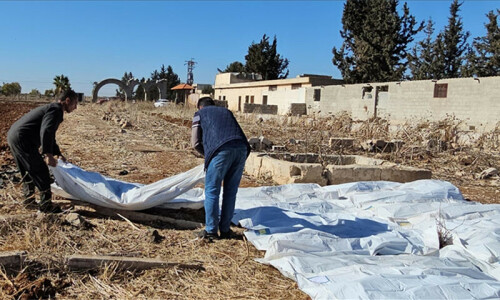KAJAB: Bloody raids by nomads armed with machine guns and rocket launchers on villages near Kabul are raising fears about a return to ethnic conflict in Afghanistan 18 months before Nato combat troops leave.
For more than a century, ethnic Pashtuns known as Kuchis have wintered in the south and east where the weather is better, and migrated in the summer to let their herds graze in the cooler north.
But a land dispute between the Kuchis and the settled ethnic Hazaras dating back 130 years has since 2005 disintegrated into seasonal violence in the Kajab valley west of the capital.
With Nato forces due to leave Afghanistan by the end of 2014, there are fears that the country could slide back to the chaos seen in the 1990s, when ethnically aligned factions fought a bloody civil war.
From the early 1990s to 2001 fighting between the Pashtun-dominated Taliban and Hazaras led to tens of thousands of deaths, particularly on the Hazara side.
“Afghans have suffered a lot in internal and mainly ethnic wars in the past, and this problem, if left unsolved could hurt the volatile national unity among Afghans even further,” said author and analyst Waheed Mujda.
In early June, up to 2,000 Kuchi nomads swept into Kajab, according to residents and local officials, ransacking several villages and burning hundreds of buildings.
Most of the valley's population of ethnic Hazaras, who are also part of the Shia minority, fled.
According to villagers, the Kuchis killed four Hazaras and seven soldiers.
Two months on from the raid, Kajab looks like a post-apocalyptic wasteland dotted with gutted, fire-blackened mud buildings.
“In each burnt home, there was a Koran. When the Americans set fire to them in the spring, the whole world cried out,” said village elder Ewaz, 55.
“But here, no one's said anything. Who are we? What have we done? We're also Muslims, aren't we?” The madrassa in Dahane Gandob village was almost totally destroyed, apparently by rocket fire.
The walls of the seminary's mosque are pockmarked with small-calibre bullet holes. A prayer room was saved, though the carpets were stolen.
The village's two medical clinics were badly damaged - the older one was completely destroyed and the other, which was not yet in service, is now unusable.
Local authorities and villagers say there were Taliban among the Kuchi raiders, suggesting that the Pashtun-dominated insurgent group could be using the Kuchis to win land away from the government and its Nato allies.
Kajab is in Behsoud district of Wardak, a province dominated by Pashtuns where the local government denies what is widely assumed to be a strong Taliban presence.
In neighbouring Uruzgan province last week, a Hazara local police commander reportedly rounded up and killed nine Pashtun civilians in revenge for the death of two local Hazaras. Authorities say the case is still under investigation.
Behsoud lawmaker Ghulan Hussein Nasseri accused the government of President Hamid Karzai, himself a Pashtun, of discriminating against Hazaras and said they would defend themselves if they were not given protection.
“The attacks of the nomads were under the support of the government,” Nasseri said.
He said he warned the national and provincial authorities the day before the attack and on the day itself, but claimed the army only arrived in Kajab five hours after the Kuchis left.
Shahidullah Shahid, spokesman for the Wardak governor, blamed a lack of resources.
“We don't have enough security forces in the area, although we have asked the central government to send us more, and even make a special force to control the Kuchis and Hazara brothers' conflict,” he said.
The clashes stemmed from a “legal issue” which was beyond the remit of the provincial authorities and should be solved through judicial channels, he added.
The nomads say they want to reclaim land given to them by a royal decree 130 years ago, which the settled communities have been living on for generations.
Hazaras make up an estimated 15 to 20 per cent of the population. They suffered brutal persecution under the 1996-2001 Taliban rule, but have prospered since the 2001 US-led invasion.
Elay Ershad, a Kuchi lawmaker, accused the Hazaras of initiating the violence.
“Hazaras said they bought that land from the government, which is not true.
Hazaras start to attack Kuchis. They have big fights,” he said.
A conflict also erupted last year in Laghman province, a Pashtun province east of Kabul, he said, arguing that giving the Kuchis their own land was the only solution.
Many Kajab residents left for good after the violence in June, abandoning their farms in what is a very green and well-cultivated valley.
“We voted for a government to protect the people. If they don't, I see a very dark future for this country,” warned Nasseri.












































